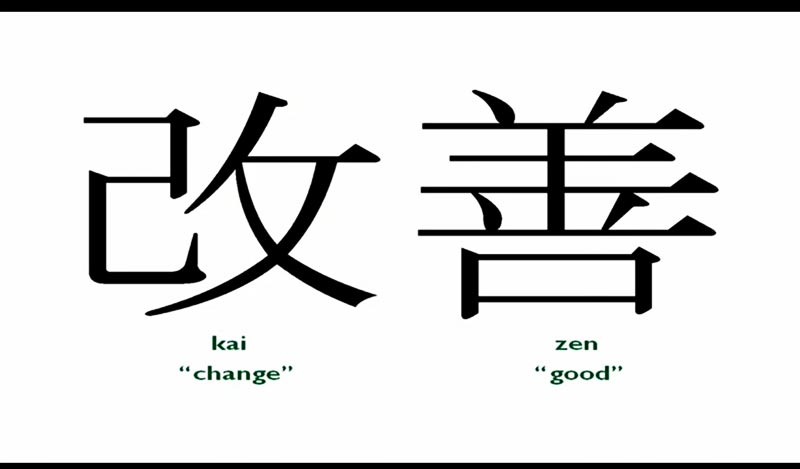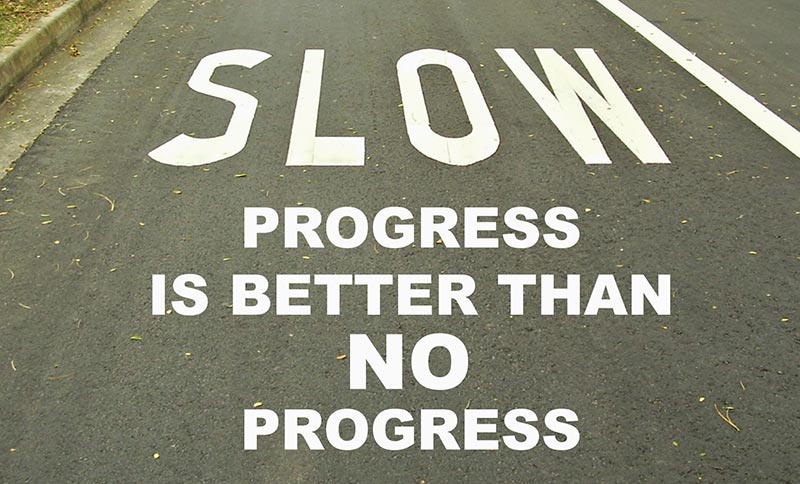
How A Small Step Can Change Your Life?
Kaizen (from Japanese ‘good change’) is a philosophy, which helps you increase the quality and efficiency of your life.
- Do you want to improve your life but every change is paralyzing you?
- Do you lack the time to focus on self-development?
- Is there always something keeping you from achieving your goals?
If you answered yes to any of these questions, you might be interested in kaizen training.
Set an achievable goal and step by step change your life.
The whole idea is based on taking “small steps” to achieve larger goals, effortlessly.
I would like to show you how this philosophy, originally implemented to help restore Japan after the Second World War, can help you right now. I recommend Kaizen techniques to anyone who has completely lost hope in the idea of changing his or her life for the better.
2 Main pillars of kaizen philosophy:
1. Change for the better
2. Continuous improvement process
Kaizen goes beyond just regularity and endurance. It’s a whole strategy developed to confuse your innate resistance to change, and acquire new behaviors without upsetting the natural state of your brain because all improvements should take place gradually.
Change can be scary. The whole point of this approach is to “re-program” your brain to stop being afraid of new patterns and behaviors, because subconsciously we tend to always choose the “familiar, stable now” instead of the “awesome, unknown future”.
By taking small steps your brain will begin removing obstacles, creating new connections between your neurons, encouraging your brain to get involved in the whole process of change without switching on your preprogramed “fight or flight response”, that you characteristically feel in response to stressful situations.
Many people are afraid of embarrassing themselves in front of others and so they give up, explaining that they didn’t have time, blaming some external circumstances or finding other excuses. The fear of failure overcomes our attempts at self-improvement.
Utilizing the “change in small steps” philosophy of Kaizen we allow our brains to adapt to the behavioral patterns we desire gradually. Later we work more intensively to get even better results. It’s often times so beyond our understanding how the change occurred that we don’t even realize how we actually broke free from the spell of the fear of failure.
Let me give you an example. The classic technique of taking small steps can begin with something as simple as making the following commitment:, “From now on I will workout a minimum of 30 minutes a day, next week a minimum of 45 minutes a day” and so on… However, in the spirit of Kaizen, the above commitment to exercise would be more like: “Ok, I want to be more fit, so I will start today. This week I will exercise 2 minutes a day, next week I will exercise 4 minutes a day etc.” The steps are so incremental, that you won’t even notice the effort put into making them, and you won’t get discouraged so easily. We start automatically doing more, achieving the larger goals we set for ourselves.
As I mentioned before, the fundamentals of Kaizen philosophy were created and implemented by Japanese corporations after WWII, to help restore the economy of the country. And it worked great! Especially for the Toyota Production System, which is known for utilizing Kaizen, and helped to rebuild the whole Japanese industry. Applying some of these rules and methods in our own quest for self-improvement can result in wonderful outcomes.
10 Kaizen Rules:
1. Problems create opportunities. 2. Ask ‘why?’ five times 3. Get ideas from everyone. 4. Think only of applicable solutions. 5. Reject the status quo. 6. Don’t make excuses that something is impossible. 7. Don’t wait for the perfect solution, choose a simple solution. 8. Use your head and not just your money. 9. Regularly correct your mistakes. 10. Self-improvement is a continual process.
How can we simply apply these methods today?
Small steps
First, let’s focus on applying these “small steps”, the spirit of Kaizen philosophy. Remember that small goals lead to more rewards. If your goals are tiny, then everything will be easier. Your brain will think ‘it’s super easy’ I know how to do it, great! Of course, now it’s time for action, so don’t procrastinate. Choose one small goal each day that will help you improve yourself effortlessly.
If you are somebody who wants to take care of your body, but always finds excuses not to, tell yourself one of these:
– I will do 5 sit-ups in the morning after waking up, or – I will do 5 crunches in the morning after waking up, or – I will eat one spoon of rice/noodles/or a bite of pizza less than I used to.
If you want to increase your knowledge and become smarter, tell yourself one of these:
– I’ll read an entry every day from the encyclopedia or – I’ll read one page of highbrow literature a day.
If you want to learn a new language:
– I’ll learn one new word every day or – I’ll find and write down one sentence in a language that I want to learn every day
If you want to quit smoking:
– I will throw away one cigarette a day, instead of smoking it
If you feel depressed and lonely:
– Once a day for 2 minutes I will think about some pleasant moment I shared with someone close to me
If you think that sitting all day in front of the computer is damaging your health:
– Once per day I will stand up next to my desk and stretch for a minute, or – I will get off the bus one stop earlier and walk home.
These goals are so small that they sound ridiculous, but it seriously works wonders after a while. When you get used to them and increase your effort, you won’t even notice that you have.
Small questions method
Another technique of Kaizen, which we can easily apply to everyday life, is the “small questions” method. Every psychologist agrees that asking yourself questions is more motivating than telling yourself what to do.
For example, if you go shopping for groceries, instead of telling yourself: “now I have to buy something healthy” ask yourself a question: “what healthy food can I purchase here? In this particular case, the point is to program your brain into thinking: ”how can I make myself healthier?” instead of treating it as some kind of obligation. The same could apply to working out. Instead of telling yourself: “I should run more!”, think: “how could I be more fit?” This kind of questioning is much more stimulating than just forcing yourself to do something.
Take care of the small things quickly
Everyone tries to avoid responsibilities from time to time. I already focused on how to stop procrastinating in my previous article but here once again I would like to remind you of the importance of taking care of the small things quickly. Anyone who has many duties knows how important it is to deal with them incrementally.
The small things look so innocent that we tend to ignore them until they pile up and become difficult to deal with quickly. If you have to respond to a message – do it right away. It may take a couple minutes to respond, but try responding to 15 messages that have piled up. It consumes a lot of energy unnecessarily! You should try giving yourself a 2-minute time frame. Make it a rule –if something takes less than 120 seconds, I will do it immediately!
If you want to change your life you have to start today and stay with it every day. There are no exceptions. Every day you are going to make some small progress, without even noticing it. You will learn that after a week, a month, a year, two years, that there has been a huge change, your progress has been enormous! The steps are so small that you can’t fail.
You can read more about how to apply kaizen principles to your personal development principles in the book written by Anthony Robbins and Robert Maurer ‘One Small Step Can Change Your life: The Kaizen Way.’








Leave a Reply